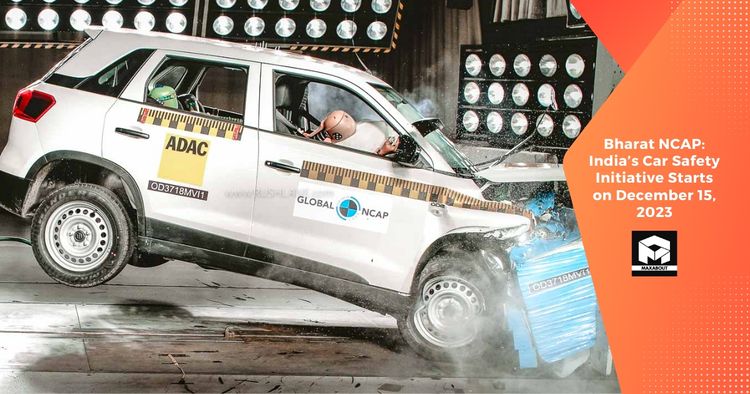Bharat NCAP, India's Car Safety Program, is set to launch on December 15, 2023. In its initial phase, several well-known car manufacturers, including Maruti, Hyundai, Mahindra, and Tata, will have their vehicles tested for safety. This campaign is a significant step towards enhancing vehicle safety on Indian roads and may have a positive impact on auto safety nationally.
Bharat NCAP Takes the Baton from Global NCAP
In India, Global NCAP has been instrumental in increasing public awareness of automobile safety. This responsibility will now be shouldered by Bharat NCAP, which is largely based on Global NCAP but is adapted to meet Indian safety standards. Similar to its predecessor, Bharat NCAP will be a catalyst for raising safety standards within the nation's auto sector. Bharat NCAP seeks to give Indian consumers more pertinent and targeted safety assessments by concentrating on regional standards and laws.
Over 3 Dozen Cars to Undergo Testing
While Bharat NCAP was officially launched on October 1, the actual crash tests are scheduled to commence on December 15. This delay is attributed to the festive season when many people take extended leaves, resulting in a shortage of personnel. In the initial phase of Bharat NCAP, more than three dozen cars, primarily from Indian, Japanese, and Korean original equipment manufacturers (OEMs), will undergo crash testing. It's important to note that participation in Bharat NCAP is voluntary; carmakers can choose whether they want their models to be tested. This voluntary approach underscores the commitment of participating car manufacturers to prioritize safety and provide consumers with transparent information about the safety of their vehicles.
Bharat NCAP's Testing Protocols
The testing protocols for Bharat NCAP closely align with those of Global NCAP. Cars will be evaluated based on three primary criteria: adult occupant protection (AOP), child occupant protection (COP), and safety assist technologies (SAT). OEMs interested in testing their cars must submit their applications (Form 70-A) to designated testing agencies. Some of the agencies authorized by the central government to conduct Bharat NCAP crash tests include the International Centre for Automotive Technology (ICAT), the Automotive Research Association of India (ARAI), and Global Automotive Research (GAR). Each tested car will be awarded points in accordance with the Automotive Indian Standard (AIS), and they will be rated from zero to five stars based on their performance in the crash tests. These comprehensive testing protocols ensure that multiple aspects of vehicle safety are thoroughly examined, providing consumers with a holistic view of a car's safety performance.
Cars Subjected to Bharat NCAP Testing
Although the complete list of car models to be tested is not available, several prominent OEMs, such as Tata Motors, Maruti Suzuki, and Mahindra, have already committed to the initiative. Tata Motors, for instance, was the first to apply for Bharat NCAP rating. Among Tata's vehicles, the newly launched Harrier and Safari facelifts will be among the first to undergo the Bharat NCAP challenge, having already received 5-star ratings in Global NCAP crash tests. Maruti is submitting three of its car models for testing, while Mahindra has applied with four models. Details about the specific car models to be tested will be revealed in the coming days. Despite the positive response from many car manufacturers, some European carmakers, including Skoda, Volkswagen, Renault, and the Stellantis Group, are still considering whether to participate, as their cars have already been tested under Global NCAP, and they may not see an immediate need for additional similar testing. Car companies from India and other countries are showing they care about making safer and better cars for people in India. They are working hard to meet the needs and wishes of Indian car buyers. This is clear when we see both Indian and foreign car companies taking part and getting involved in this effort. It means they are listening to what people want and are trying to make cars that match those desires.

